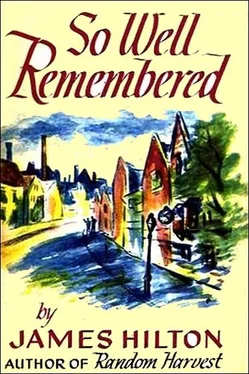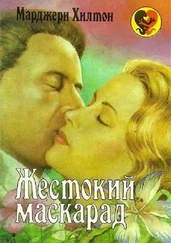Джеймс Хилтон - So Well Remembered
Здесь есть возможность читать онлайн «Джеймс Хилтон - So Well Remembered» весь текст электронной книги совершенно бесплатно (целиком полную версию без сокращений). В некоторых случаях можно слушать аудио, скачать через торрент в формате fb2 и присутствует краткое содержание. Год выпуска: 1945, Жанр: Проза, на английском языке. Описание произведения, (предисловие) а так же отзывы посетителей доступны на портале библиотеки ЛибКат.
- Название:So Well Remembered
- Автор:
- Жанр:
- Год:1945
- ISBN:нет данных
- Рейтинг книги:5 / 5. Голосов: 1
-
Избранное:Добавить в избранное
- Отзывы:
-
Ваша оценка:
- 100
- 1
- 2
- 3
- 4
- 5
So Well Remembered: краткое содержание, описание и аннотация
Предлагаем к чтению аннотацию, описание, краткое содержание или предисловие (зависит от того, что написал сам автор книги «So Well Remembered»). Если вы не нашли необходимую информацию о книге — напишите в комментариях, мы постараемся отыскать её.
So Well Remembered — читать онлайн бесплатно полную книгу (весь текст) целиком
Ниже представлен текст книги, разбитый по страницам. Система сохранения места последней прочитанной страницы, позволяет с удобством читать онлайн бесплатно книгу «So Well Remembered», без необходимости каждый раз заново искать на чём Вы остановились. Поставьте закладку, и сможете в любой момент перейти на страницу, на которой закончили чтение.
Интервал:
Закладка:
George wrote back, and they both kept up the correspondence without ever referring to the personal matter again; nor did the youth even mention his mother, or the progress of her homeward journey across the world. George could not but feel that a barrier—temporarily, at any rate— had come between them, and there returned to him his earlier shyness, diffidence, and reluctance to believe that Charles really wanted to continue the friendship. Then one day he read that the ship containing some hundreds of women and children repatriated from Japanese prison-camps had put into an English harbour. It was his turn to write, but he put it off, thinking that even out of turn he could expect a letter from the boy about his mother —telling of her arrival, condition, and attitude. When such a letter did not come he eventually wrote briefly and rather meaninglessly about nothing in particular, but to that letter he received no answer, and when, after writing again, there was still no answer, he could reach only one conclusion.
“I’m not surprised,” he told Wendover. “He probably thought it as good a way as any other to close an episode.”
“That’s a rather tragic interpretation, George.”
“I don’t think so. I wanted to help him, nothing more—and now Livia’s back, perhaps he doesn’t need help. Or at any rate, perhaps I’m no longer one who CAN help him.”
“I hope it isn’t going to worry you.”
“No.” George’s answer was decisive. “Give me something to do and I’ll worry over it. But when I can do nothing…”
But George did worry, nevertheless, if that was an adequate word for the quiet intrusion of thoughts about the boy into every momentarily unoccupied fragment of his time and mind. Those fragments, however, were few on account of increasing pressure of official work. There was, for instance, Browdley’s annual budget which, as chairman of the Finance Committee, he must prepare for annual presentation. More urgent still was a general tightening-up of air-raid precautions and civilian defence, for which London had issued specific instructions, believing that northern England’s long period of relative freedom from enemy air attacks might be coming to an end. There were also meetings and conferences on other matters with the Medical Officer about a chickenpox outbreak, with local union officials and plant-management committees, with regional groups in charge of War Loan drives, charitable funds, and so on. Least arduous of all—indeed, a kind of optional luxury in which George frankly indulged himself amidst all the urgent necessities—was an interview with an idealist town-planner whose vision of a new Browdley included wide boulevards, American-style apartment houses, and glass-walled factories.
George almost forgot his personal affairs as he turned over the nicely water-coloured drawings and marvelled at large green blobs representing trees that could not possibly grow to such a size in less than twenty years. But there was an even more fundamental anachronism. “Do you realize,” he said, a trifle impishly, “that your plan would mean pulling down practically the whole town?”
“That was rather the idea,” came the quiet reply.
George laughed. “I see. And it might be a good one except that if you once did pull the place down I can’t really imagine why anyone should want to rebuild it at all. It’s really only here because it’s here, so to say. A century ago they needed coal for the cotton mills, so they had to build the cotton mills near the coal—but now they don’t need the coal so much, in normal times, or the cotton mills either. I doubt if they’d put up half of these towns if they had the chance to begin all over again.”
“I know what you mean, sir. Growth and then decay. It happens with towns as with human beings.”
“With countries, too, and empires.”
“And down to the smallest villages. There’s a place near here called Stoneclough—”
George started at the sound of the mispronounced word. “CLUFF—they call it. You’ve been there?”
“Yes, I just happened along—by accident. Very interesting. Seems to be completely uninhabited, including the big house at the top of the hill.”
“Aye—there’s nobody at Stoneclough any more.”
“I took some photographs—thought of working it up into an article —The Forsaken Village, or some such title. But I doubt if it would be of enough general interest till after the war.”
“And maybe not then,” George answered moodily.
But he liked all such contacts with enthusiasts in their own special fields. As a contrast, it fell to him the same week to visit the parliamentary member for Browdley, none other than that same Wetherall (now Sir Samuel) who had defeated him in the 1919 by- election, again in the general election of 1923, and had represented the town in the House of Commons ever since. An old man now; and like most former enemies, he had made his peace with George. The political truce since the war began had brought them even closer, so that George was genuinely sorry to hear that Wetherall was ill. They spent an afternoon together in the manufacturer’s house just outside Browdley, talking over old times and old squabbles. Wetherall was still rich, still worried about taxes, still unaware that anything had happened to make the world vitally different since he was a boy. His solution for the problems of the post-war cotton trade was that all Indians should wear their shirts a few inches longer, and he couldn’t understand how the Japs could possibly have taken Singapore after the place had cost the British taxpayer so much money to fortify. Capping it all, he persisted in believing that George had changed during the years into someone much more like himself; it gave him satisfaction to say (as if to justify his own liking for the Mayor)—“Ah, you’re not such a firebrand as you used to be. You’ve seen a bit of reason these last few years.”
George, reflecting what he HAD seen—the blitz raid on Mulcaster, for instance—hardly thought he would call it reason. But why argue with an old fellow who looked as if only his illusions could nourish him precariously for a few more years at most?
Wetherall went on: “Just as well I’ve kept you out of Parliament till you’ve grown sensible, George. You’ll not do so bad when your time comes.”
“Why… what… what makes you say that?”
“George, you old twister, don’t pretend it never entered your mind before! Listen—and this is in confidence—I probably won’t stand at the next election. God knows when that’ll be—after the war or after I kick the bucket, whichever comes first. But I’m telling you this so you’ll be ready.”
George was suddenly aware of the peculiar truth that it HADN’T been in his mind, not for quite a time, and that it revisited him now as an almost strange idea, with all kinds of new angles and aspects to be considered. He said, sincerely enough: “I’m sorry you’re thinking of giving up, Sam. Over twenty years for the same constituency must be pretty near the record…”
“Yes, and it’s meant a lot of hard work, one way and another, but I don’t grudge anything I’ve done for the town, any more than you do, George. After all, it’s Browdley that made me what I am.”
George thought that was very possible.
“So when they sent me to Parliament I made up my mind I’d do the best I could for them.”
George thought that was very possible also, since during the entire period of his membership of the House, Wetherall had made only two speeches. One was about the local sewage scheme, which George had persuaded him to be for; the other was against the revision of the Anglican Prayer Book, which nothing could persuade him to be anything but against.
George said cheerfully: “Well, Sam—don’t give up yet. And I wish you’d try to fix things with the Ministry about our Children’s Home. We ought to get an extra grant for that, what with all the kids from the bombed areas we’ve taken in…”
Читать дальшеИнтервал:
Закладка:
Похожие книги на «So Well Remembered»
Представляем Вашему вниманию похожие книги на «So Well Remembered» списком для выбора. Мы отобрали схожую по названию и смыслу литературу в надежде предоставить читателям больше вариантов отыскать новые, интересные, ещё непрочитанные произведения.
Обсуждение, отзывы о книге «So Well Remembered» и просто собственные мнения читателей. Оставьте ваши комментарии, напишите, что Вы думаете о произведении, его смысле или главных героях. Укажите что конкретно понравилось, а что нет, и почему Вы так считаете.










